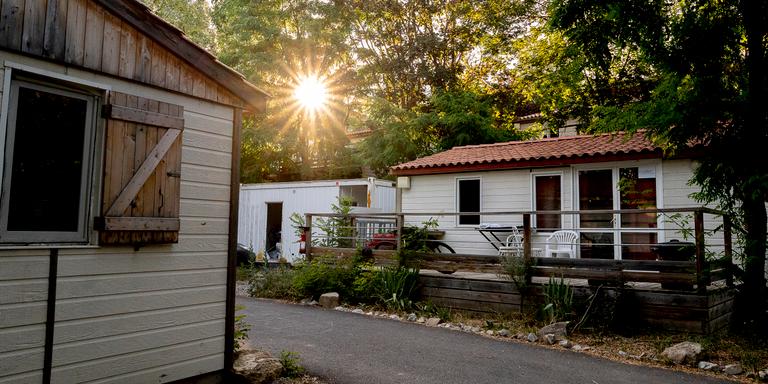


At an Alpine campsite housing undocumented migrants, 'winter is the hardest'
NewsMore than one hundred migrants are housed alongside tourists at a campsite in Gap, France, pending the normalization of their immigration status.
It was karaoke night at Le Napoléon. On the small terrace of this three-star campsite high above Gap, vacationers lingered over a late meal while their children sang the chorus of a song by rapper Naps. Meanwhile on the outskirts of the resort grounds, in small chalets that are "almost" similar to those used by tourists, people without permanent homes were getting ready to go to bed.
The situation of emergency accommodation in a campsite is almost unheard of in France, but it has become a long-term solution in this department of 140,000 people on the Italian border. According to local authorities, 112 people – most of them undocumented and mainly from West Africa, with some from Eastern Europe – are currently housed in chalets at the Napoléon campsite. They are mainly families and make up a majority of the people housed by the emergency housing system in the Hautes-Alpes department, near the Italian border. "In recent years, the emergency accommodation system has grown from 64 places in 2017 to 175 today," said the local prefecture in an e-mail, stressing that "the system is currently full."
Since the end of 2016, the Hautes-Alpes has become one of the stopovers on the migratory route from the Balkans or the Italian shores of the Mediterranean. "The use of this campsite began during the rapid, massive arrival of migrants from the Italian border in 2017," explained the prefecture. "It was a way to accommodate them with decent living conditions, (...) depending on the buildings and spaces available."
For example, Fjorentina (whose name was changed at her request), a 31-year-old Albanian woman, has been living here for almost four years with her husband and two children. Pauline, a 36-year-old woman from Congo-Kinshasa, has been living in a chalet for almost five years. She had initially applied for asylum in Paris, but the government sent her, her husband and their five children to a reception center in Gap. After being refused refugee status, the family moved into emergency accommodation at the Napoléon. Odile Carrau, a member of Cimade and the JRS Welcome reception network, believes that "the municipality does not provide places to accommodate people." Right-wing mayor Roger Didier admitted that two years ago he was "opposed" to the use of a downtown hotel for emergency accommodation. "It's not decent," he argued to Le Monde.
An inaccessible site
Queen, a 35-year-old Nigerian woman, might agree with his statement. Before arriving at the Napoleon, she lived for a year in a "small room" in a hotel with her husband and two children, and she "certainly didn't want to go back there." In France, of the 200,000 emergency accommodation places available, around 70,000 are in hotels. For the past three years, Queen has appreciated the peace and quiet of the campground and the privacy offered by living in a chalet, with its own kitchen and bathroom facilities. "Camping is better," agreed Lahouaria, a 38-year-old Algerian mother of four who spent two years in a room in a Formule 1 motel, even though she now shares a bed with her husband and youngest son. "It's not great, but that's how it is," she continued. "Winter is the hardest. It's very cold."
You have 55.89% of this article left to read. The rest is for subscribers only.
